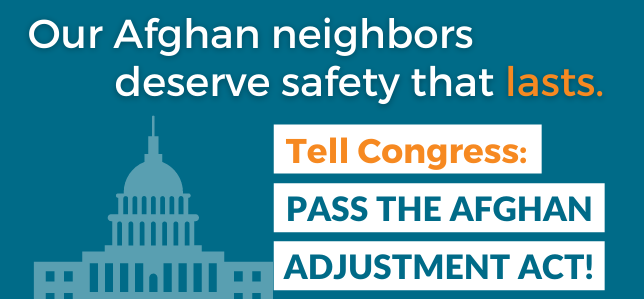
Join CMC in demanding that Congress pass an Afghan Adjustment Act in order to provide at-risk Afghans a permanent legal pathway to safety. Follow the steps at the bottom of the page to tell your Congress Representatives: Afghans deserve safety that lasts.
The following information was developed by the Evacuate Our Allies Coalition. For additional information, visit their Afghan Adjustment Act Fact Sheet.
Following the U.S. military withdrawal from Afghanistan, tens of thousands of U.S.-affiliated and at-risk Afghans were evacuated to the United States via humanitarian parole, a temporary allowance to enter and remain in the United States for one or two years. Despite receiving this life-saving evacuation, Afghans under this status will soon find themselves under a cloud of legal uncertainty, and in a worse position in terms of immigration status than had they entered as Special Immigrant Visa holders (SIVs) or refugees through the U.S. Refugee Admissions Program (USRAP).
To resolve this, Congress must pass the Afghan Adjustment Act, patterned after similar adjustment acts passed following previous U.S. wartime evacuations, including for Cubans after the rise of Castro, Southeast Asians after the Fall of Saigon, and Iraqi Kurds during the rule of Saddam Hussein.
What is the Afghan Adjustment Act?
The Afghan Adjustment Act allows certain Afghan evacuees to apply for permanent status after one year of being paroled into the country. It prevents Afghans paroled in the U.S. from losing their jobs or being deported while their applications for these statuses are pending.
How did the U.S. government vet and screen evacuees?
Intelligence, law enforcement, and counterterrorism professionals conducted a robust, multi-layered screening and security vetting process that includes review of biographic and biometric data checked against U.S. and Interpol intelligence databases, as well as pre- and post-arrival medical screenings and vaccinations. These screenings were conducted for all Afghans before they arrived in the United States and again once when they arrived in America, while most were housed over months on military bases across the U.S. If at any time an individual does not pass a screening, they are deemed inadmissible or deportable, depending on where they are in the process. As a result, that individual and their family cannot enter the United States or are subject to deportation from the U.S.
Who supports the Afghan Adjustment Act?
National security experts, refugee resettlement agencies, Afghan-Americans, faith leaders, veterans groups, attorneys, and local communities representing a broad spectrum of political and social views have called for an Afghan Adjustment Act.
What happens to Afghan evacuees if the Adjustment Act isn’t passed?
Without an Afghan Adjustment Act, tens of thousands of recently arrived Afghans will have to find an existing immigration pathway in order to remain in lawful status once their parole expires. In all likelihood, that will mean tens of thousands of new asylum claims at an estimated cost of $700,000,000 in legal services to support Afghans through the arduous asylum application process. The current affirmative asylum backlog is more than 600,000 cases with a broader immigration backlog of 1.4 million cases. Many Afghan evacuees were forced to destroy important documentation during the evacuation in order to avoid Taliban violence across a patchwork of checkpoints around the country. Many Afghan visa applicants (and others) had important documentation destroyed by the U.S. Embassy in Kabul as the city fell. Such complications could make asylum claims more difficult and increase the likelihood that Afghan parolees will end up in already-overwhelmed immigration courts and eligible for deportation.
The Afghan Adjustment Act meets well-established precedent, but it does something else which is fundamentally important: it meets the moral obligations we have to those who served alongside the U.S. mission and it provides lasting stability to Afghans who were brought to safety by the U.S. following the longest military engagement in American history.
Congress must act now to pass an Afghan Adjustment Act.
Follow these steps to contact Senators and Congress Representatives:
- Step 1: Find your Congressperson’s email address here.
- Step 2: Find your Senators’ email addresses here.
- Step 3: Copy and Paste each email address into an email window, and enter in the Subject Line “Pass the Afghan Adjustment Act”
- Step 4: Copy and paste the following text into the email body – feel free to adjust and/or add any personal messages!
Dear Congressperson/Senator Name,
As your constituent from city/town, I am writing to ask for your support for an Afghan Adjustment Act to allow Afghans who entered the United States on humanitarian parole to have a pathway to permanent legal status. Creating a track to apply to become lawful permanent residents after one year in the U.S. will strengthen arrivals’ integration in their new communities. This is urgent, as humanitarian parole is a temporary allowance to enter and remain in the United States, and is only viable for two years. We have already supported the resettlement of these parolees with money and resources, and they will undoubtedly contribute greatly to our communities – this indefinite limbo of unstable immigration status creates a chasm between Afghan evacuees and their ability to fully settle into their new home. I urge you to pass the Afghan Adjustment Act so that our Afghan allies can live prosperous lives as Americans, something which they all deserve.
Sincerely,
Your Name
Thank you for taking action to ensure your new Afghan neighbors can have a safe and stable life in the United States!

